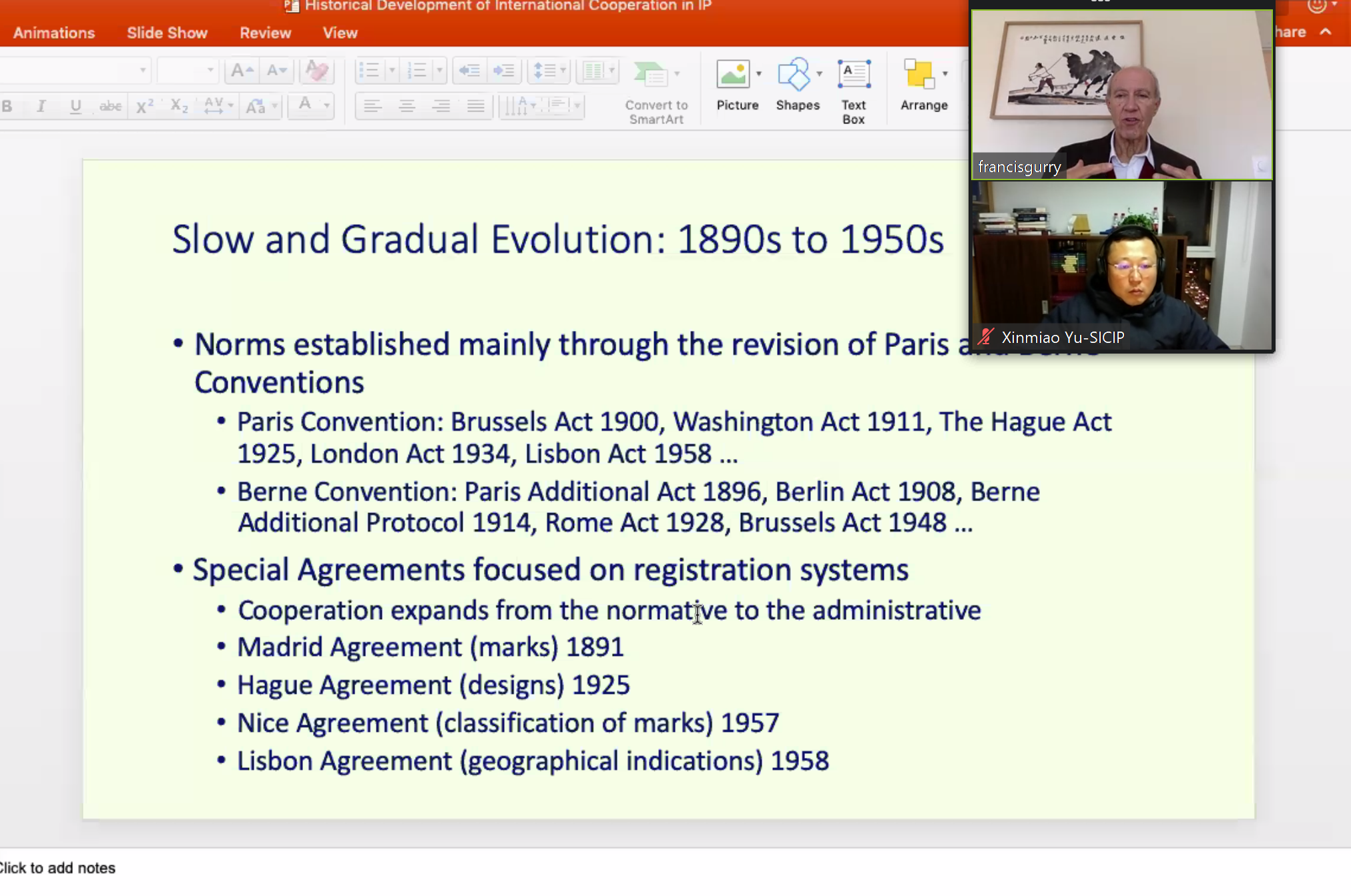

On the evening of December 15, 2021, Professor Francis Gurry, former Director-General of the United Nations World Intellectual Property Organization (WIPO) and Honorary Dean of the Shanghai International College of Intellectual Property (SICIP) of Tongji University, delivered an online academic lecture entitled "Historical Development of International Cooperation in IP" to nearly 300 teachers and students of Tongji University. Prof. Song Xiaoting, the Chairman of the SICIP Council, Prof. Shan Xiaoguang, the Dean of SICIP, Ms. Lin Min, the Vice Chairman of the SICIP Council, Prof. Jiang Nan, the Deputy Dean of SICIP, and others teaching staff of SICIP attended online. The lecture was presided over by Prof. Yu Xinmiao, the Deputy Dean of SICIP.

Prof. Francis Gurry has examined the development of international cooperation on intellectual property in the past 130 years. The 19th Century saw the establishment of institutional cooperation at the international level, driven by the wave of globalization that prevailed in the second half of the 19th Century and by industrialization. Though the initial expression of international cooperation was limited to a small number of major industrialized countries, its treaty architecture established that provided for a coherent future development and expansion of the system. During this period, international cooperation passed through a phase of disruption occasioned by the two world wars of the 20th Century. Following the Second World War, the process of decolonization led to the formation of numerous new States which started to join the international system for intellectual property from the 1970s onwards, ushering in numerous changes, including different perspectives on the role of intellectual property, a changed balance of power in the membership of the WIPO and, ultimately, the rise of China and Asia as major new poles in the international system. In addition, the conclusion of the TRIPS Agreement within the World Trade Organization, a move led by the United States of America and other industrialized countries, changed the dynamics of international cooperation, as well as the design of that cooperation. Finally, Prof. Francis Gurry also shared some thoughts on the development of international rules on intellectual property in the new era, such as the current tendency to move from universal multilateralism to alliance multilateralism, and the resulting international governance challenges of growing competition in new technologies stemming from the digital and bio-sciences revolutions.
In the nearly 2-hour lecture, Prof. Francis Gurry, with his profound knowledge, professional skills and extremely rich practical experiences, highly summarized and condensed the achievements and experiences of the development process of international cooperation in intellectual property rights for more than 100 years, and put forward profound thoughts on the future trend of international cooperation in intellectual property rights under the background of unprecedented changes in the world in 100 years, thus providing teachers and students at Tongji University with an IP knowledge feast.
Next semester, Prof. Francis Gurry will continue to share his views on specific issues such as cooperation organization, technology use and transfer, traditional knowledge and so on from the perspective of International IP Cooperation. Please keep informed.
Introduction of Professor Francis Gurry:
Prof. Francis Gurry is the former Director-General of WIPO. He was reappointed in May 2014 for a second six-year term until September 2020. Under his leadership, WIPO responded to many major challenges. In order to enable WIPO to meet these evolving challenges, Francis Gurry led a comprehensive organizational change plan that aligned WIPO's plans, resources and structure with the redefined strategic objectives. These measures included managing the pressures on the international patent and copyright system resulting from rapid technological change, globalization and increasing demand; reducing the knowledge gap between developed and developing countries; and ensuring that the intellectual property (IP) system serves its fundamental purpose of promoting national creativity and innovation.
Introduction of Shanghai International College of Intellectual Property:
In November 2016, with the support of the United Nations World Intellectual Property Organization (WIPO) and China's National Intellectual Property Administration (CNIPA) and the Shanghai Municipal Government, Tongji University has established the "Shanghai International College of Intellectual Property". Tongji University is the only university in China (including Hong Kong, Macao and Taiwan) that cooperates with WIPO in the form of joint training of Master’s Degree Program in Intellectual Property with Specialization in Design (WIPO program). At present, SICIP has built the “National Patent Protection Base”, “National Intellectual Property Training Base (Shanghai)”, “National Intellectual Property Strategy Research Base” with the support of the CNIPA, and established Research Center of China-EU Innovation Policy and Law is with the support of Ministry of Science and Technology. SICIP keeps a long-term relationship with Max Planck institute for innovation and competition (MPI), Ludwig-Maximilians-Universitat München (LMU),Humboldt University of Berlin, Konstanz University, Polytechnic University of Turin, University of Florence, Hanken School of Economics in Finland, US Patent and Trademark Office, George Washington University, Russia’s National Institute of Intellectual Property etc.
At present, SICIP has gathered a number of well-known domestic intellectual property experts and scholars and a group of potential young scholars, and is committed to inviting domestic and abroad famous scholars as adjunct or visiting professor, appoints famous IP judges and lawyers as supervisor to guide student legal practice. In recent years, the teaching staffs of SICIP have participated in and presided over a number of major key projects of the National Social Science Fund, and have obtained a number of high-level scientific research achievements.






 0086-021-65983113
0086-021-65983113  sicip_intoff@tongji.edu.cn
sicip_intoff@tongji.edu.cn